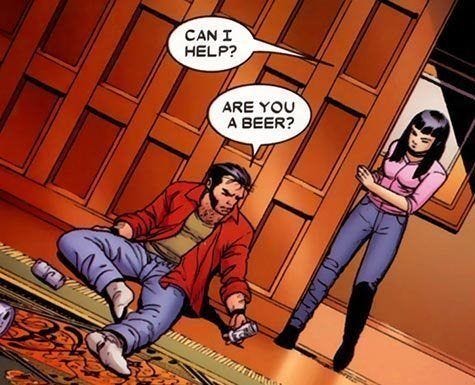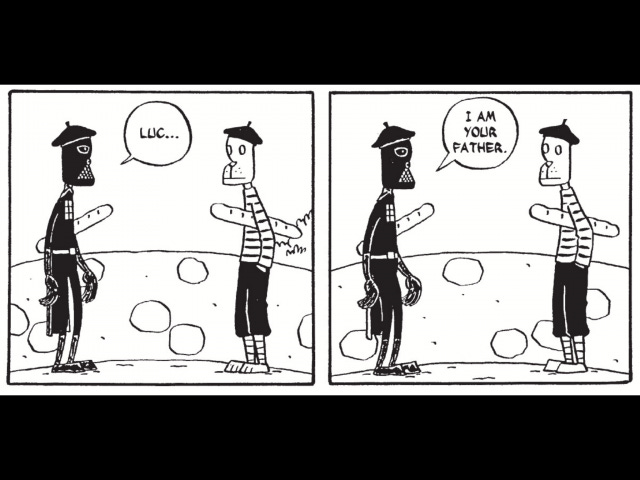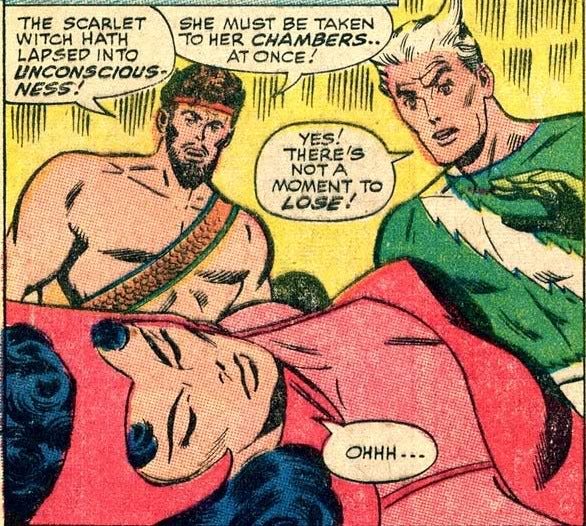EPISODE 216 -- IMAGINE ALL THE PEOPLE

POP CULTURE SPIRIT WOW
One of the more unusual parts about living with a whole bunch of men who are as old as your parents (or even grandparents) is that you hear a lot of stories of one version or another of “the old days”. The rules they had to follow when they entered the Society; the crazy/awful/saintly Jesuits they once lived or worked with; what it was like sleeping through the night without having to use the restroom...it all comes up.
My favorite stories are about the Novitiate, those first two years of a Jesuit’s training. Imagine upwards of 100 men (a term used advisedly, as almost all of them were just out of high school), living all together in one huge institutional building, trying to figure out a life of poverty, chastity and obedience while allowed to speak mostly only in a language that has been dead for almost two thousand years (Latin).
That was the context for the initial training of pretty much every American Jesuit who is today seventy or older (which in the States accounts for over half our men). The many transformations and modernizations of Vatican II were coming, but most weren’t yet here, and so young men entering found themselves thrust into a more or less medieval monastic existence, with bizarre penances and rules and an austerity that is mostly very off-putting today.
(Having said that, most of the stories guys tell are about the many creative ways they got around the rules and had a good time. These are Jesuits, after all.)
One novitiate phrase that comes up quite often is the concept of “particular friendships”. Every minute of the novices’ days was highly structured, including their periods of recreation. Guys were encouraged to go out, take walks or whatever; but they were not allowed to go in pairs; a third had to be present at all times, lest there develop a “particular friendship”.
Now, how many of those 18-year-olds living in the 1940s, 50s and early 60s would have understood what was being implied there? Probably not many. It was instead about not forming cliques, not excluding others – you enter the Society, everybody’s your brother.
But for you and me today, the real implication – or perhaps better put, anxiety -- is clear. And from what I can tell these concerns about sexuality were never spoken about. Indeed, if someone had asked for clarity, I’m going to guess depending on the novice director they would have gotten either a vague, Yoda-like Zen koan of an answer or a very stern talking to. (Novice directors have absolute authority in the Society; they can toss anyone at any time and for any reason, and some of these guys back then were very happy to exercise that power. “You keep your cassock messy, Brother. I don’t think you belong here.” It could be as ridiculous and final as that.)
For me, that insistence that two men not be left alone together is fascinating not only for the fear that it implies – I mean, ask yourself, why would the U.S. Church of the 1940s and 50s be so worried about men falling in love? In its own bizarre repressed way it actually shows an awareness of sexuality ahead of its time – but for the awareness it tried to prevent. In a very real way, the particular friendships policy was an attempt to stop men from recognizing an essential part of the truth either about themselves or humanity in general, that there were people who had this attraction. Which for the times is not surprising; indeed, those who created such policies probably saw themselves as protecting their men from a deeply unhealthy and dangerous temptation.
But still, the effect was both to silence and to more or less airbrush out of existence those people and attractions.

++
I was thinking about that last week. I had the Sunday Mass at a parish near where I live, and the Gospel was the two disciples on the road to Emmaus. For those who don’t know it: It’s a couple days after the crucifixion, and there’s been rumors of Jesus’ tomb being empty. These two disciples are walking to the town of Emmaus just sort of reeling amidst it all.
And they meet this guy on the road, who’s like “Hey, whaddup?” And they’re like “Jesus, bro.” And he’s like “Huh?” And they’re like, “Bro: You don’t know about Jesus?” And the guy’s like, “Naw, bro, I’ve been hitting the waves for days.”
And they’re like: “BRO.”
And they tell him everything’s that gone on and how they’re doing and who Jesus was and what he meant to them.
And then he’s like, “But wait, hold up, Broseph,” and then he tells his own story and compares what they’re saying about Jesus with his own knowledge of the Scripture and life experience. And when he’s done they’re just like
“...Whoa.”
[And yes, this is a story about Jewish surfers, they are a vastly underrepresented group in the Scriptures, check out the New Testament stories about the Sea of Galilee and tell me those waves don’t sound TIGHT.]
And then he’s like “Well, lades, bro” and they’re all “Hey, chill with us for the night, we’re getting tacos,” and he’s like “Tacos? Hells yeah”, and he sticks with them, but then at one point they ask him for a piece of tortilla and as he breaks a piece off and offers it to them they realize whoa, he’s Jesus. And BAM, just like that he’s gone.
There’s lots of different ways of taking that story. Like, it’s about how God is always or already in our midst, we just need to listen for him; or it’s about how Jesus was in fact the Messiah the scriptures had foretold. (One undercurrent you find throughout the post-resurrection scriptures is the desire to prove that the crucifixion was actually part of God’s plan, as from the outside it seems like the clearest evidence of all that Jesus could not possibly be the Messiah.) Or it’s about how Jesus got sweet sweet teleportation skills. (Walking through walls, teleportation -- post-resurrection existence is going to be AWESOME.) But I don’t know, as I was sitting with the readings this time I kept thinking about how the heart of the tale is that Jesus is present to them in the sharing of their stories -- what they have each seen and heard and felt and feared and worried. And in our training as Jesuits, one of the things we do regularly is faith sharing, where we sit with a group of other Jesuits and share a little bit of what’s going on in our lives. And no matter whether what’s shared is super mundane or intensely personal, the experience is this very meaningful sense of connection with one another and to God. It’s like the experiences that we have, whether they’re positive or negative, are kind of meant to be shared – that in the sharing we gain new insights and/or we’re released from some of what we’re carrying. And that the others listening do/are too.
When the Jesuits said “no particular friendships (except with the U.K., and even then, think Margaret Thatcher, not Freddie Mercury)”, they thought they were protecting their men and their institution.
But I don’t know, right now I’m wondering if the insight of Emmaus is that when you silence or erase a group from your consciousness, you not only hurt that group, you keep yourself and your institution from the fullest life and relationship with God.

For example – and I admit not everyone will probably be with me on this – today any number of priests are gay and happily celibate and doing good work in the Church. And yet by and large they’re not able to talk about that. And God knows, I don't mean to say I want to hear about their sexual experiences; for me, there’s nothing so weird and uncomfortable as listening to a priest in a homily telling stories about old dating experiences. I mean I get it, you weren’t always a priest, you’re human just like the rest of us; but this isn’t Oprah and I don’t really need that information.
No what I mean is, these priests can’t talk about what it was like to discover this important aspect of their identity, or the experiences of shame or rejection or just plain fear that many of them have gone through – things that we all can relate to whether we’re gay or not, and that are a fundamental part of the way that God has been present and worked in their lives.
It’s not that they can’t do good work without talking about all that, or that those experiences don’t inform their ministry in very positive ways. They do! But I don’t know, for me the Emmaus insight seems to be that those stories and experiences were not just meant for them, and in fact that it’s only in the sharing of them in some way that the fullness of the grace of God that is within all that is released.
We talk about how horrible experiences withheld can become like a cancer, but maybe that’s true of all experiences. If you can’t share it, it eventually goes bad.

++
It’s been sort of a week of these sorts of thoughts for me. Last Thursday was the 20th anniversary of the episode of the sitcom Ellen where Ellen Degeneres came out. Today that might seem like, “Really, that’s a thing that we memorialize?” But twenty years ago, it had never been done. I mean yes, there had been some gay characters in pop culture, most of them *wink, wink* straight men like Paul Lynde or Tony Randall.
But “Ellen” was the first show that did coming out the way that people actually experience it, as something that they wrestle with and discover about themselves over time; or, for straight friends and family, as a revelation from someone they’ve grown to know and love and understand differently. (“Ellen” was actually in its fourth season when protagonist Ellen Morgan came out).
Degeneres had apparently pushed for the story for some time, but ABC hadn’t wanted to do it, fearing blowback. (Not an unrealistic fear: a year after Ellen came out the great Catholic parish show Nothing Sacred didn’t even make it through its first season after right-wing Catholic groups mounted scare campaigns against it. Ironically, the show was created by a Catholic priest. (Then again, he was a Jesuit.))
At the same time, the show had been no great shakes ratings-wise. The only storylines that had ever really worked, according to executive producer Mark Driscoll, were the episodes where Ellen went on dates with men and they were awkward and/or disasters.
For me, what’s still so striking and resonant about the episode (which you can find here) is how much it focuses on just the struggle to say what’s in your heart. There’s no big sexy kiss here, no cut to her in bed, no public moment of validation. The whole story is just Ellen fighting to get to the point of being able to say the truth out loud, even wondering at the end “Why can’t I just say the words?” Her trademark stammer has never made more heartfelt sense.
42 million people watched that episode. Degeneres and her team won an Emmy and a Peabody for it. Today many young people probably find it dated and hard to appreciate. Little do they know, her willingness to share her own life in this story is part of why they’re able to.

++
Maybe our imaginations are sort of like our arteries – as we get older and more settled, they tend quite naturally to narrow and become less flexible, because what they’re exposed to is more often familiar.
To the extent that our imaginations are exposed to people who are not like us, who are surprising and foreign and even strange (to us), whether on TV or in real life, maybe there’s more chance they stay resilient and agile, and we are better able to see not only others’ lives but our own differently.
We speak of compassion and empathy in terms of the heart, but really, maybe in the end it’s more about the capacity of our imaginations.
++ LINKS ++

I just read this fascinating piece from last summer’s New York Times Magazine about Margaret Crane, the woman who developed the first home pregnancy test. Believe it or not (he says tongue in cheek) men tried to shut the idea down, out of a concern that “left to their own devices” women who discovered they were pregnant without a doctor present would become hysterical and either kill themselves or abort their child. You know women—always needing a father figure to help them understand and manage things.
Eventually, of course, the men came around. And, also of course, they then tried to shut Crane out of development of the product. (Their prototypes were covered in flowers and frilly tassels, because again, you know women. The Times reporter comments: “Ms. Crane thought this was insane: What customer would want to analyze her urine in a box with a tassel?”)
A great article.
Last week the Pope did a TED talk. Seriously, the man popes like no pope ever poped.
There’s a lot of great stuff in it (plus, I don’t know if it’s just me, but I find just watching him is really enriching – which hmm, sounds kind of stalkery, actually, but I don’t know, what can I say, the guy’s got presence, your honor, I really didn’t think he’d mind if I stood outside his window and just watched him for a couple hours).
Lastly, Saturday is Free Comic Book Day!

(Hence all my comic book art this episode.)
At pretty much every comic book store everywhere in the world (really!), they’ll be handing out new comic books for free. Many of them have big sales, too. If you’re interested or have a little person in your life who might be, I really recommend it. Comic book people are nice people, and more than anything they like to be able to share the cool stories they’ve discovered with other readers, especially kids.
You can find a comic book store in your area here.
Here’s list of the comics that were just announced as nominees for the Eisner, the comic version of the Oscar. (From that list, Faith and Paper Girls are stories I’d very much recommend for tweens and above; The Vision and Saga are fantastic stories for adults. And so are The Wicked + The Divine and Injection, which did not make the list but totally should have.)
(And, if you’re at all interested in the making or theory behind comics, here’s a super cool article on a style of structuring the page that is sort of making a come back.)
One last thing: I don’t if this will be of interest to anyone, but a crazy idea because I really do love comic books -- if you email me on Saturday and send me your mailing address and one sentence about you (or someone else), I will send you a comic book. And not some 30 year old worn out dumpster fire comic; something pretty recent, and freaking good.
I guarantee a comic for the first twenty people who write me. If possible I’ll accommodate a bunch more.
Have a good week. Keep your chin up. You have something to offer this world, and we need it.


